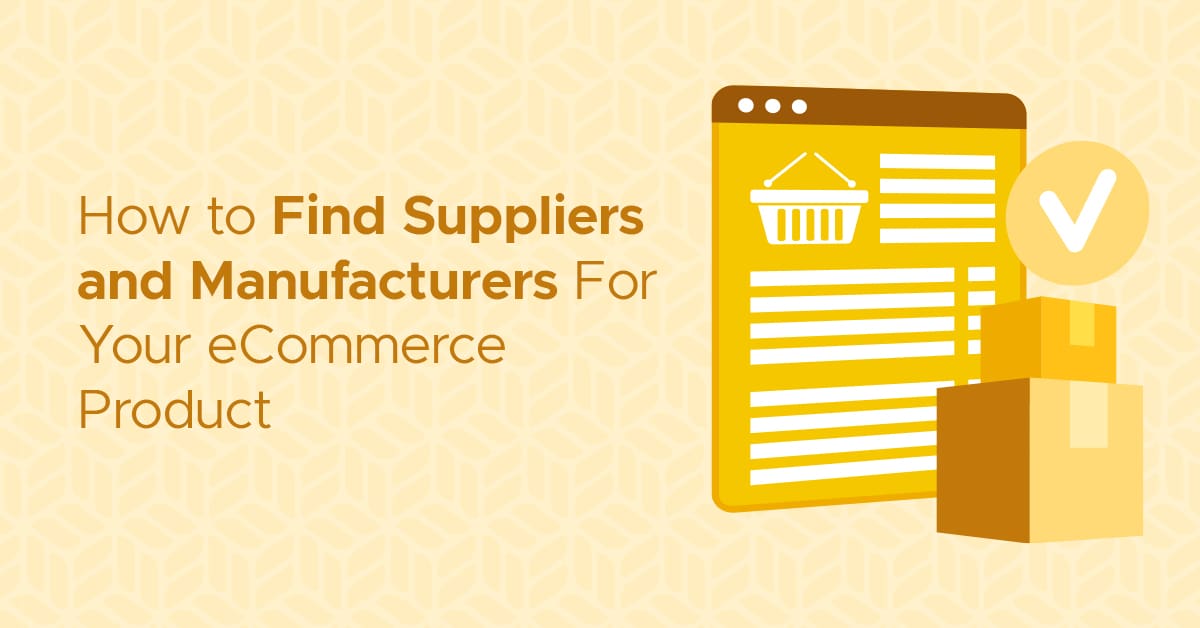
How to Find Suppliers and Manufacturers for Your eCommerce Product

Having a business idea is easy; the real challenge is bringing it to life. That’s why many great ideas remain wistful thoughts in people’s heads. But with a trusted supplier and manufacturer, those potentials can become a reality.
You’re already halfway there if you know where to look and which suppliers and manufacturers to contact. While it takes a lot of work, it’s a critical step in bringing your vision to life.
In this article, we’ll guide you through that process, sharing ideas on where to find reliable partners and what to do next to get your business off the ground.
The bedrock of business
Suppliers and manufacturers are distinct entities that play key roles in the supply chain:
- A supplier provides the items or materials you need to create your goods or stock your inventory. They typically source everything from raw materials to finished products and sell them to retailers. Businesses can have multiple suppliers, with some larger ones having hundreds or even thousands.
- Manufacturers are the ones who actually produce the goods. They create products from raw materials in small or large batches and can often customize items to meet your specific needs. Manufacturers take your ideas and turn them into tangible products ready for consumers to buy.
How suppliers and manufacturers work together
While suppliers and manufacturers serve different roles, they work hand in hand to support your business. In fact, companies that collaborate with these entities experience greater growth, lower operating costs, and higher profitability.
1. Product sourcing
Product sourcing involves finding and acquiring goods or raw materials for your business to sell. Here, suppliers and manufacturers collaborate based on your specific demands. For example, a supplier can step in once your manufacturer takes your specifications and develops the goods or materials you need. They’ll purchase the finished products from manufacturers and manage the logistics of sending them to businesses, retailers, or customers.
2. Inventory management
Suppliers and manufacturers help keep your inventory in check by preventing both overstocking and understocking.
Manufacturers focus on producing goods, so they typically don’t hold large inventories. Meanwhile, suppliers purchase items in bulk from manufacturers and manage that stock. This cooperation allows manufacturers to focus on production while suppliers manage inventory. As a result, businesses can rely on a steady supply to satisfy customer demand.
3. Order fulfillment
At this stage, manufacturers produce goods in bulk to meet supplier demand. Suppliers then fulfill orders from businesses or retailers, acting as the middlemen between manufacturers and end customers.
4. Pricing and negotiation
Suppliers and manufacturers establish pricing that takes all important factors into account. Manufacturers set the base cost of production, which includes raw materials, labor, and operational expenses. Other elements also influence the total, such as:
- Product complexity
- Order volume
- Customization requirements
In turn, suppliers negotiate with manufacturers to secure better rates on bulk orders. Then, they set competitive prices for businesses and retailers.
5. Logistics and distribution
Since manufacturers primarily focus on production, they lack the resources to handle logistics and distribution directly. Once products are finished, they typically ship them to suppliers or distribution centers.
Suppliers can manage logistics and usually have relationships with carriers and fulfillment providers. This lets them efficiently coordinate the transportation and delivery of goods.
6. Product development and feedback
Suppliers and manufacturers can enhance your product by providing valuable feedback at every stage, from the initial concept to the finished product.
Manufacturers use their expertise to craft prototypes and initial samples. They can offer insights on materials, design feasibility, and production techniques. For their part, suppliers share market knowledge and customer feedback, imparting intel on:
- Pricing
- Quality
- Trends
- Demand
7. Quality assurance
While manufacturers focus on ensuring your products meet quality standards during production, suppliers provide an extra layer of assurance by conducting additional quality checks. They verify the products not only meet necessary sales standards but also align with the expectations of your target market before distribution.
Apart from that, suppliers help maintain quality during storage to prevent any damage and ensure the product’s integrity remains intact.
Where to find suppliers and manufacturers for your business
To locate the right suppliers and manufacturers for your business, check these sources:
- Online directories: Platforms like Alibaba, ThomasNet, and Global Sources are fantastic resources to connect you to manufacturers worldwide. These directories make browsing various products and suppliers easy so you can find exactly what you need. Plus, you can often reach out directly to suppliers to ask questions or negotiate terms.
- Trade shows: Events like the Canton Fair present a fantastic opportunity to interact with a wide range of suppliers and manufacturers all in one place. At these shows, you can explore many booths showcasing products, ask questions, and gain a feel for the quality of their offerings.
- Sourcing agents: Having an expert by your side who knows the ins and outs of the industry can be an asset. They understand your needs and have a network of reliable contacts at their fingertips. With the aid of sourcing agents, you can hone in on high-quality and reliable partners that align with your vision.
- Industry-specific forums: Online communities are filled with like-minded individuals and businesses. Joining them allows you to engage in discussions, ask questions, and uncover valuable insights for free.
- Social media: One of the easiest ways to find manufacturers and suppliers is through social media. You can reach out to industry professionals, check company profiles, and even read reviews and recommendations from your network.
Tip: Check out popular manufacturing hubs in China (and what they’re known for) for some ideas on where to start.
After you’ve found a supplier and manufacturer
Once you’ve honed in on your sources, you can proceed to the next crucial steps that’ll help set you up for success:
- Request samples and quotes: First things first: Ask for product samples. Evaluate the quality of the goods they offer and request production times and quotes. That will help you compare product standards, pricing, and lead times. These factors can give you a clearer picture of whether their offerings fit your budget.
- Check reviews and references: Customer feedback and recommendations reveal the supplier’s reputation. Since you’ll be collaborating closely, it’s wise to hear from other businesses that have worked with them before or still have an active contract.
- Visit factories (if possible): Visiting the manufacturer’s facility lets you see firsthand if they meet your quality standards and have the necessary production capabilities. It’s also a great way to build a personal relationship with your manufacturer, which is helpful down the line.
- Negotiate terms and contracts: Negotiate payment terms, lead times, and shipping arrangements to clarify your expectations of your chosen suppliers and manufacturers. Detailed contracts will help avoid misunderstandings later on, giving you peace of mind as you move forward.
Wrapping up — Lay the foundation for a successful product with reliable suppliers and manufacturers
Choosing suppliers and manufacturers is crucial for your business, as they enable your ideas to blossom. The two work in synergy, with suppliers providing the necessary materials to craft your offering, and manufacturers then developing a physical product. The production and quality of your idea hinges on these roles, so you need to devote time to find the right ones.
Once you’ve committed to your partners and are ready to launch your offering, consider MyFBAPrep for all your logistical needs. With years of experience in the fulfillment services industry, we can guide you through the complexities of bringing your products to market with an efficient and cost-effective solution.


